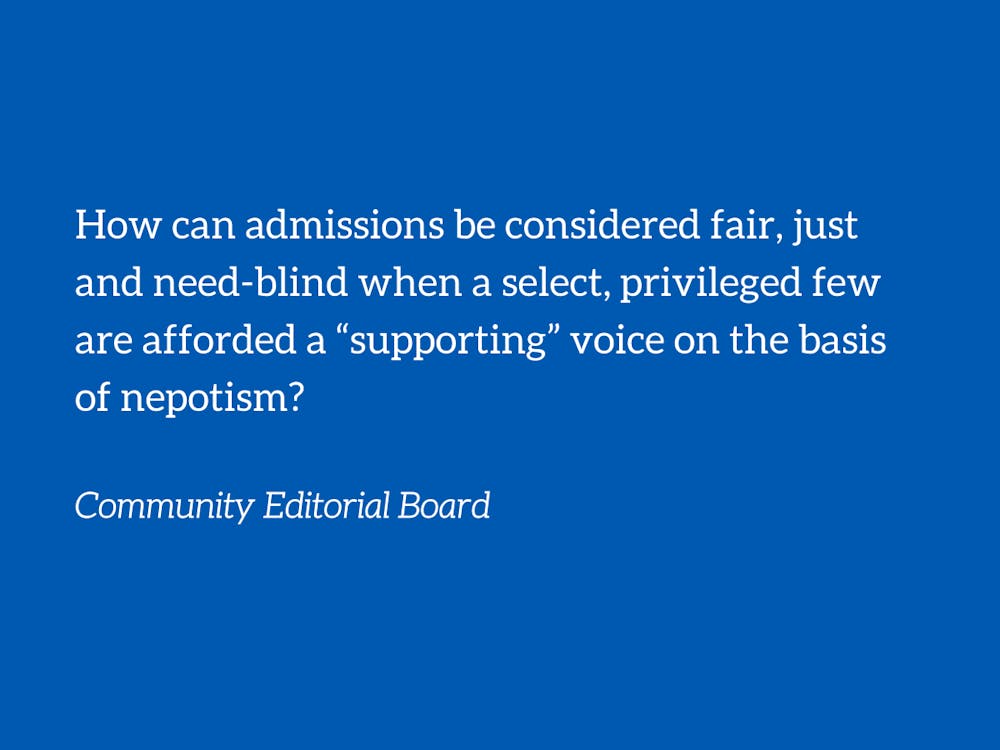This week, Duke will release admissions decisions for thousands of Early Decision applicants. Hundreds of students will be receiving the good news: a place at one of the most elite institutions in the country. Education is always thought of as a great equalizer. However, at Duke, children and grandchildren of alumni are given special consideration in the admissions cycle. If historical data is upheld, 19% of the incoming Trinity Class of 2025 will hold legacy status. Legacy admissions, whether unintentionally or by design, do very little to reduce the inequalities present in higher education. Duke specifically must confront how its adaptation of this admissions policy impacts the classes they accept.
On top of offering special “guidance to applicants,” the Duke Alumni Association states on its admissions page that “while alumni affiliation by no means ensures acceptance to Duke, the university… does note alumni status when reviewing applications.” Additionally, the Alumni Association provides “a supporting voice for all alumni children and grandchildren who apply for undergraduate admission.” How this voice is utilized is ambiguous, but it is clear that children of Duke alumni have an advantage that is not given to the rest of the applicant pool. How can admissions be considered fair, just and need-blind when a select, privileged few are afforded a “supporting” voice on the basis of nepotism?
Duke’s legacy admissions prioritization must be abolished. No one gets to choose the factors of their birth; they can not decide their sex, their race, their socioeconomic status, nor whether their parents went to Duke University. Every student should be able to apply and receive acceptance entirely off their own merit – truly blind of financial need, and truly blind of the accomplishments of their family.
Legacy admissions serves as an immoral detriment to applicants who were not privileged to be born into an alumni family. Legacy status for undergraduate applicants is often an indicator for financial ability. After all, Duke alumni can expect to earn $108,900 10 years after graduating. It is no doubt that the children of many of these alumni have benefitted from thousands of hours and countless dollars spent on application preparation. In a nod to nepotism, their acceptance letter affirms their parents’ investments and sets a dangerous precedent for future students.
It is clear why Duke considers legacy status in its admissions process – the University needs the promise of full-paying students and the continued donations of alumni. Since Duke provides financial aid to approximately half of its undergraduate student body, the school must maintain a minimum number of full-paying students to sustain this practice. Consequently, financial status plays a significant role in the admissions process despite Duke’s need-blind sticker tag. Moreover, accepting an alumni’s child is one way to ensure that former students retain a financial interest in the university.
That being said, legacy admissions do not constitute the only immoral and un-meritocratic practice in the Duke admissions process, thus, abolishing this aspect will not take away the inequality in Duke admissions. Although the admissions office hides behind a “need-blind” policy, a student’s financial status still lingers over their application as it is expressed through their address, extracurriculars and school history. In this way, legacy status is not the only indicator of a student’s ability to pay, and despite their best efforts, socioeconomic status would be impossible for the admissions office to completely ignore. While it will not cure inequality, abolishing legacy admissions will extinguish the embers of nepotism in this process.
Compounding the harmful impact of legacy admissions is the fact that institutions of higher education across the country are facing significant financial struggle due to the Covid-19 pandemic. Although top universities have continued their need-blind admissions processes, the problems with legacy admission could be exacerbated during times where universities may require financial assistance in the coming years to recover from the impacts of the pandemic. Duke is one of those universities.
Duke should pursue more meritocratic admission processes over profit-driven legacy admissions to truly compete with peer institutions. A number of peer schools do not use this aristocratic policy, including the Massachusetts Institute of Technology; the University of California, Berkeley; the California Institute of Technology; the University of Washington; and Johns Hopkin University, alongside the top English schools, the University of Cambridge and the University of Oxford.
We can and should mirror the universities who have taken steps towards a more meritocratic admissions process. Johns Hopkins, for instance, abolished legacy admissions in January. President Ronald Daniels was deeply disturbed by the socioeconomic and racial inequalities that legacy admissions perpetuates in higher education. In his Atlantic op-ed on legacy admissions, Daniels notes that legacy students “are more likely to be wealthy and white than non-legacy students, the very existence of legacy preferences limits access for high-achieving low- and middle-income students, and also for African American, Latino and Native American students.”
The question of which values Duke wants to uphold is inextricably tied to the debate surrounding legacy preference in the admissions process. President Vincent Price, and our entire student body, can no longer stand idle while a policy is in place that goes against every grain of meritocracy that Duke claims to represent. Duke must define what type of school it wants to be and then act on those values. The University prides itself on its role in promoting social mobility, but practicing legacy admissions reduces Duke to another institution that promotes nepotism as the avenue to success.
Community Editorial Board Member Ezra Loeb (T’22) abstained from voting on this edit.
Get The Chronicle straight to your inbox
Sign up for our weekly newsletter. Cancel at any time.

